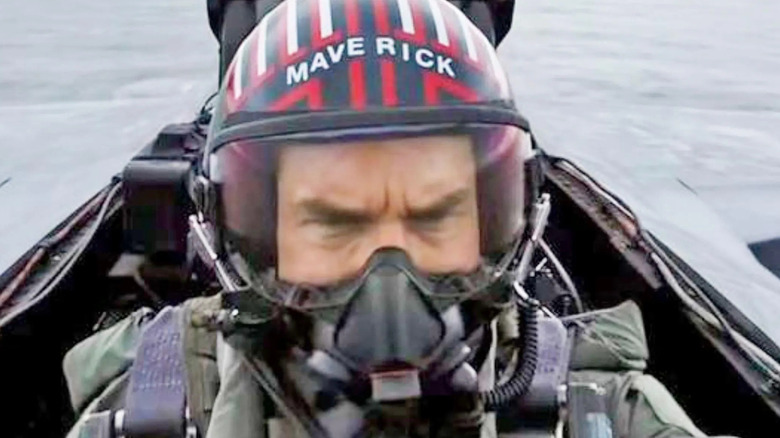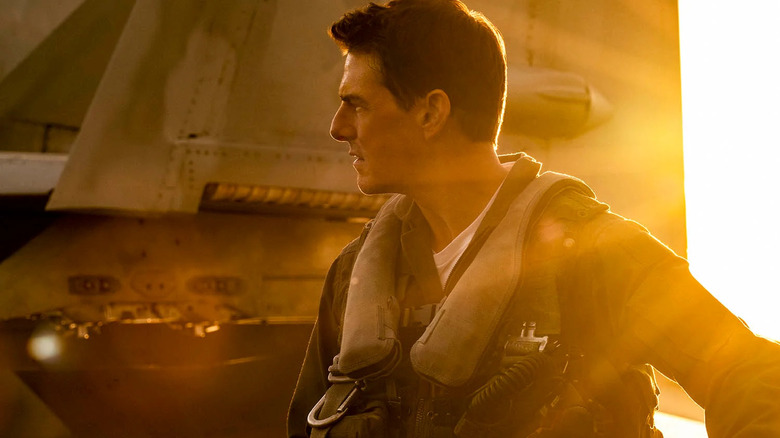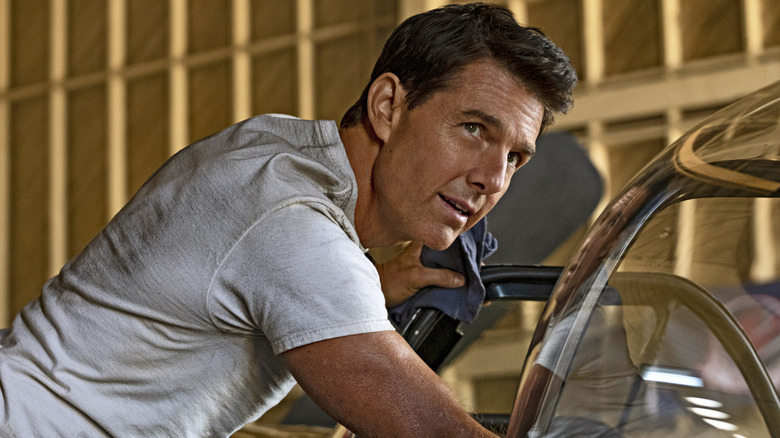Top Gun: Maverick Review: Return To The Danger Zone
Hollywood is stuck in the age of the legacy-quel. Ever since the "Jurassic Park" and "Star Wars" franchises relaunched themselves in new multi-billion dollar iterations back in 2015, a new model for the decades-too-late sequel was formed — push the story forward with new characters, but bring back the old ones in supporting roles to guarantee the nostalgia bucks at the box office. It's such a well-worn trope now, it even got parodied in this year's "Scream" film, the biggest meta flourish in a movie which also very deliberately acted as both a soft reboot and a fifth installment in a horror saga.
Arriving in theaters four whole years after it was filmed, "Top Gun: Maverick" offers nothing in the way of surprise now that the legacy sequel playbook is as well worn as it is. And yet, despite appearing late in this current trend cycle, it might be the finest example of it to date — a film that is at its weakest when evoking nostalgia for the 1986 original, because it is so much stronger a story when focusing on how the years have treated Tom Cruise's titular hero since then. Fans of the original "Top Gun" will love it — but the biggest sign of its success will be that it will likely find admirers even among those who didn't care for the previous installment (I count myself among them), a rarity for a franchise trend that banks on audience nostalgia over anything else.
More than Mere Nostalgia...
It's in the initial opening stretch that the film prepares you for the worst kind of nostalgia cash-in experience. Opening to Harold Faltermeyer's score from the original, we get the same onscreen text introducing us to the concept of the Top Gun program from the first film — before cutting to a near shot-for-shot update of the opening credits, right down to the text font and the use of Kenny Loggins' "Danger Zone." Thankfully, the film never cynically replicates sequences from the original quite like this ever again, with the only scene that gets close being an updating of the first film's famously homoerotic volleyball sequence. And it does need to be said: the overall lack of homoeroticism this time around might be the only area where the film has considerably downgraded from that.
Following these credits, we're introduced to Maverick (Cruise) in the present day. In the time that's intervened since the first film, his improbable ability to keep succeeding on missions that would have killed off anybody else have effectively made him the Navy's very own Han Solo, with at least one death-defying mission in this film being the equivalent to doing the Kessel Run in 12 parsecs. One of these occurs within the opening fifteen minutes, quite breathtakingly, as Maverick is brought to a navy test base to fly a jet that can go ten times beyond the speed of sound, which is in danger of being recommissioned due to budget cuts. As someone who quite famously feels the need for speed, Maverick hits this target, but pushes the engine too far, causing it to combust and bringing him crash landing back to Earth where he's given a new job by his stressed out superiors: return to the Top Gun Academy and teach a new generation of pilots instead of causing more chaos on duty.
There are hints of another classic action movie trope, which the film effectively pokes fun at. Maverick is back for "one last job" — but as his love interest, played by Jennifer Connelly, points out, most of the time that has elapsed since the first "Top Gun" has been spent by him returning to do the mission he swears will be his last. Connelly effectively adds personality and humor to a fairly underwritten romantic role designed simply to replace Kelly McGillis' equivalent character from the original, who is never once mentioned here; you will be forgiven for initially thinking the role has simply been recast with a better known face. Outside of her comic relief, the story is treated with the upmost sincerity, something which proves effective despite how recognizable every last narrative beat in the film is. There are no surprises as to whether Rooster (Miles Teller) will bury the hatchet with Maverick to continue the legacy of his father, Maverick's former wingman Goose (played by Anthony Edwards in 1986), or whether Maverick will succeed at training the new recruits and completing his most life threatening mission yet.
Somehow, "Top Gun: Maverick" overcomes these considerable hurdles with ease; the third act in particular contains some of the best aerial warfare committed to film, the team's mission staged so effectively that it left me on the edge of my seat, despite knowing the inevitable outcome. In the original film, the best known but arguably among the weakest films by the late director Tony Scott, the climactic overhead battles could become incomprehensible as they reached their final stages. Here, director Joseph Kosinski is effective in explaining the geography of the mission from the outset, with the specific technical details the pilots need to be keenly aware of never becoming jargon you'd have to keep leaving the theater to Google, just to know what's going on. Kosinski clearly adores the original, but has studied it enough to understand how to improve upon it — the same tactic he used with his debut film, 2010's "Tron: Legacy." He might very well become the go-to filmmaker when you need a safe pair of hands to direct a legacy sequel.
... But not all of this Gun reaches the Top
Cruise has long stated that one of his pre-conditions for agreeing to make a "Top Gun" sequel was that Val Kilmer had to appear in it. His wish was granted and Kilmer appears via cameo to reprise his role as Iceman, a lovingly made sequence that rewrites the character in line with the actor's own health problems (he's in recovery from throat cancer); it's a scene that would flirt with exploitation were Kilmer clearly not so happy to be reprising the role that made him a household name to audiences worldwide. But following this cameo, the way the film continues Iceman's story feels deeply uncomfortable, creating drama by following an arc which seems to use Kilmer's real life condition as nothing more than a tool to push the story forward. It may be fiction, but the established similarities between actor and this new iteration of the character do make for uneasy viewing, an unfortunate undermining of an effectively moving cameo.
Much like its '80s predecessor, there will be significant (and not unjustifiable) criticism of the film as a stealth military recruitment vehicle. In an age when the sheer size of the American defense budget receives more widespread criticism than ever, a film whose opening set piece involves proving that an unused, multi-million dollar jet isn't a waste of taxpayer money is likely going to be a hard sell to many audiences. Despite this, there is a sense that Kosinski and his three credited screenwriters have prioritized action movie bombast over honing in on specific narrative details to create something genuinely apolitical, which would have wider international appeal beyond the deeply patriotic US audience.
This is never clearer than in the third act mission, which sees the pilots fly to an unnamed country to battle an enemy that's either kept offscreen or obscured by masks worn in the cockpit, a decision not unlike Christopher Nolan's approach to depicting the Nazis in "Dunkirk." Like most modern blockbusters, it's arguably more attuned to the needs of the international box office than its own storytelling. Rather surprisingly, in this case at least, this conscious effort to avoid any traits of the jingoistic action movie work very well in its favor; it can be enjoyed as spectacle, even if it is just using a different tactic to mimic the original film's attempt to sanitize the US navy by removing anything approaching a real world threat.
"Top Gun: Maverick" is the ideal model for a legacy sequel, improving upon the original even if some of its inherent flaws carry over. It's not quite as perfect as other critics have stated, but it is the decade's first summer blockbuster likely to leave you exhilarated by the end.


